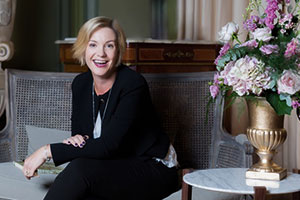The sudden downpour of snow and extreme weather in early March had a catastrophic impact on roads, businesses and schools almost everywhere, but one area that didn’t seem to grind to a halt was the wedding sector. Waddesdon Manor in Buckinghamshire reported its biggest and most vibrant wedding inspiration show yet, according to industry specialist Kelly Chandler from www.kellychandlerconsulting.co.uk who was one of the lead organisers. Here Kelly talks to Vows and Venues about her experience of organising the event and her top tips for planning your wedding event.
 During what was reported to be the worst weekend to travel, 650 visitors across five hours attended – and of that, 400 visitors flooded through the doors in the space of two hours.
During what was reported to be the worst weekend to travel, 650 visitors across five hours attended – and of that, 400 visitors flooded through the doors in the space of two hours.
“It just goes to show the resilience of brides-to-be and their focus on getting their planning just right, despite the challenging conditions,” commented Kelly.
“The serious side to this, however, has to be on the number of dream team suppliers we didn’t want to let down by cancelling, many of whom had travelled from further afield to meet and greet clients on the day.”
With the worst of the weather hopefully behind us, how can other wedding venues future proof the success of their events and market them to maximise attendance on the day, come rain, wind, sunshine and even snow?
Kelly adds: “The weather conditions – whether it is too hot, cold, rainy or snowy will always present certain challenges but if an event is marketed and planned out correctly, it can be a success.”
Kelly’s top tips on planning a wedding event
1. Plan early
If you’re hosting a wedding event for more than 100 people, start planning six-months in advance. For smaller-scale events, I would suggest a three-month lead time. Ensure all suppliers are in place and details are finalised three weeks beforehand and don’t accept any late comers – deadlines are key!
2. Build your team
No matter how big or small the event is, have a team of people around you who you can delegate tasks. Ensure that your team has contrasting skills so you know who is the best fit for carrying out certain jobs.
3. Rehearse
Like most weddings, rehearsals are an important part of the big day and the same applies to other events too. Two weeks in advance, set aside time to do a run through of the entire event; organise a meeting with your team and walk through everything. This is where complications are often highlighted and there will be time to correct them. A few days before the event organise another run through at the venue.
4. Marketing
In addition to a robust schedule of deadlines, ensure there is a marketing strategy in place from the very start of the project and which builds momentum as the date gets closer. Bring everything in to that plan, including advertising, PR, social media and even influencer-led marketing to capture the interest of potential attendees.
5. Don’t forget the follow up
It can be easy to relax once an event is over but the final push should be in the form of a follow up email a day or so after the event. Ensure names and emails are registered as this is a vital component in email marketing for the next event.
Kelly concludes: “During the snow weekend, we made the right call not to cancel, and the effort we all put in as a team paid off. When you have a great mix of people in place working towards a common goal, events often run smoothly, whatever the weather.”


Add new comment